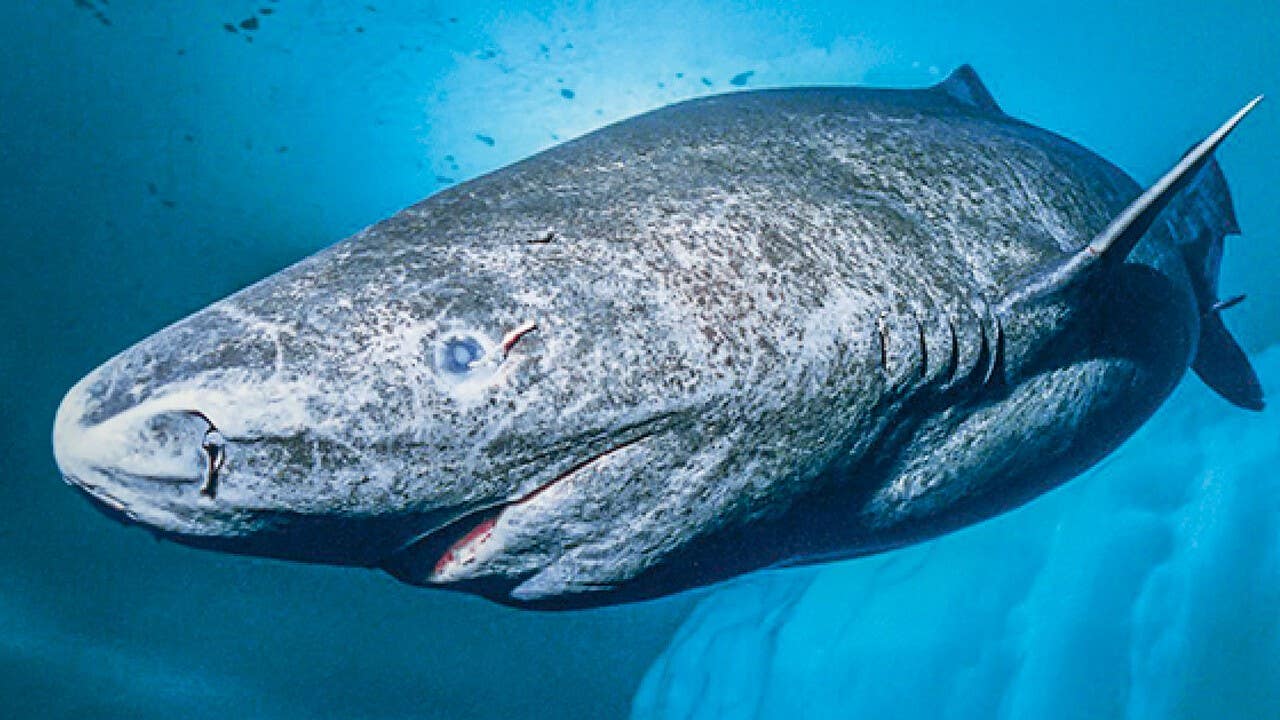Biologists discover 500-year-old shark – the oldest living vertebrate on Earth
Imagine discovering a Greenland shark that could live to 500 years old, quietly gliding through the deep waters of the ocean.

These sharks inhabit the cold, stable environments of the North Atlantic and Arctic surface waters, growing just a few centimeters each year. (CREDIT: Nick Caloyianis/National Geographic Creative)
Imagine discovering a creature that could be as old as 500 years, swimming in the depths of the ocean. This is exactly what you find with the Greenland shark, a species now recognized as the longest-lived vertebrate in the world.
Julius Nielsen, a marine biologist at the University of Copenhagen, led a research team that made this groundbreaking discovery. They found a Greenland shark that was at least 272 years old, possibly even reaching 500 years in age, surpassing the previous record held by a 211-year-old bowhead whale.
Determining the age of Greenland sharks
Determining the age of many fish is done by counting the growth layers in calcium carbonate "stones" found in their ears, similar to counting tree rings. However, sharks don't have these earstones. Additionally, the Greenland shark lacks other calcium-rich tissues suitable for this method. Instead, scientists used a different technique: examining the lenses in their eyes.
The lens of a shark's eye is made of proteins that accumulate over time. The proteins at the center of the lens are formed while the shark is still developing in its mother's womb. By figuring out the age of these proteins, scientists can estimate the shark's age.
To do this, scientists used radiocarbon dating. This method measures the levels of carbon-14, a type of carbon that decays over time. By applying this technique to the proteins at the center of each lens, scientists were able to estimate a broad age range for each shark.
One shark, measuring five meters, was found to be at least 272 years old, with an upper age estimate of more than 500 years (392 +/- 120 years). Another specimen was at least 260 years old, potentially exceeding 400 years. “We definitely expected the sharks to be old, but we didn’t expect that it would be the longest-living vertebrate animal,” Nielsen said.
Related Stories:
These sharks inhabit the cold, stable environments of the North Atlantic and Arctic surface waters, growing just a few centimeters each year. Despite their slow growth rate, they can reach over five meters in length and often serve as apex predators in their ecosystem.
Aging Greenland sharks was once considered impossible. Other fish species are aged by measuring calcareous bodies in their ears, but Greenland sharks lack these hard-boned structures, as their skeletons are made of cartilage. Instead, Nielsen and his team examined the radiation in the sharks’ eyes. During the 1950s and '60s, nuclear bomb tests introduced radioactive particles into the atmosphere, which were then absorbed by living organisms, including the sharks.
Greenland sharks have unique eye lens tissue that remains unchanged throughout their lives, preserving historic radiation. This eye lens is composed of specialized material with metabolically inert proteins, meaning once synthesized, they are not renewed. By isolating the tissue formed when the shark was a pup, the researchers performed radiocarbon dating to estimate ages.
For the study, the team examined 28 sharks that had died after being caught as by-catch in fishing nets. While there is some uncertainty in the age estimates, Nielsen stated that the most likely age for the oldest shark was about 390 years, with a 95 percent certainty range of 272 to 512 years.
Steven Austad, an aging biology expert at the University of Alabama, Birmingham, remarked, “It’s a fascinating paper and certainly moves back the vertebrate longevity record by a substantial amount. Even at the low end of their estimate—272 years—that’s still substantially longer than any other documented vertebrate.”
These findings have significant implications for the conservation of Greenland sharks. The team believes these sharks reach sexual maturity only when they are around four meters long, which could take about 150 years.
This extreme longevity suggests that Greenland sharks might still be recovering from overfishing that occurred before World War II. “When you evaluate the size distribution all over the North Atlantic, it is quite rare that you see sexually mature females, and quite rare that you find newborn pups or juveniles,” Nielsen explained.
Most of the sharks observed are sub-adults, likely a result of historical overfishing. The older, sexually mature sharks are no longer present in large numbers, and there aren’t enough mature individuals to produce new generations. While there is still a significant population of ‘teenagers’, it will take another century for them to become sexually active.
This study not only reveals the incredible longevity of Greenland sharks but also underscores the vulnerability of nature to human activities. The findings highlight the importance of conservation efforts to protect these ancient creatures and their ecosystems. As you explore the natural world, studies like this remind you of the delicate balance needed to sustain such remarkable life forms.
Note: Materials provided above by The Brighter Side of News. Content may be edited for style and length.
Like these kind of feel good stories? Get The Brighter Side of News' newsletter.
Rebecca Shavit
Science & Technology Journalist | Innovation Storyteller
Based in Los Angeles, Rebecca Shavit is a dedicated science and technology journalist who writes for The Brighter Side of News, an online publication committed to highlighting positive and transformative stories from around the world. With a passion for uncovering groundbreaking discoveries and innovations, she brings to light the scientific advancements shaping a better future. Her reporting spans a wide range of topics, from cutting-edge medical breakthroughs and artificial intelligence to green technology and space exploration. With a keen ability to translate complex concepts into engaging and accessible stories, she makes science and innovation relatable to a broad audience.



